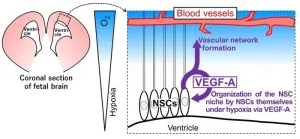(Press-News.org) A team of chemical engineering researchers has developed a self-driven lab that is capable of identifying and optimizing new complex multistep reaction routes for the synthesis of advanced functional materials and molecules. In a proof-of-concept demonstration, the system found a more efficient way to produce high-quality semiconductor nanocrystals that are used in optical and photonic devices.
“Progress in materials and molecular discovery is slow, because conventional techniques for discovering new chemistries rely on varying one parameter at a time using siloed operations in chemistry and materials science labs,” says Milad Abolhasani, corresponding author of a paper on the work and a professor of chemical and biomolecular engineering at North Carolina State University. “If a complex chemistry includes dozens of parameters, it might take decades to develop a new target material or a more efficient way to produce a desired chemical.
“Our system, called AlphaFlow, makes use of an artificial intelligence technique called reinforcement learning that – when coupled with automated microfluidic devices – expedites the material discovery process. We’ve shown that AlphaFlow can conduct more experiments than 100 human chemists in the same period of time, while using less than 0.01% of the relevant chemicals. It effectively miniaturizes the experiments and performs the same laboratory operations that would require an entire wet chemistry lab in a suitcase-sized end-to-end experimental platform. It’s extremely efficient.”
AlphaFlow’s AI model makes decisions on what experiment to conduct next based on two things: the data it has developed from experiments it already ran and what it predicts the results of the next several experiments will be.
“We use this moving window of prior action steps and predicted outcomes of future action sequences to inform AlphaFlow’s decision making. From this, AlphaFlow can account for actions with delayed effects and also pivot its decision making based on the most recent experimental outcomes in real time,” says Amanda Volk, first author of the paper and a Ph.D. student at NC State. “Basically, the system is capable of immediately learning from and adapting to unexpected results.”
This is true whether the system is focused on discovering a new chemical or optimizing the manufacturing process for a known chemical. The difference being that, for discovery, the system is trying to determine which precursors need to be added, as well as the best order in which to add them, in order to find a chemistry with the best performance. Whereas for optimization, the AI model already knows which precursors need to be added, and in which order. As a result, AlphaFlow’s focus for optimization is on determining what amount of each precursor is needed, as well as the amount of time needed for each reaction, to reach optimal performance most efficiently.
“This integration of AI and chemistry reduces the amount of time it takes to develop new chemistries by at least an order of magnitude,” Abolhasani says. “Think on the order of hours, instead of months or years.”
“AlphaFlow also offers new insights into fundamental chemistry,” Volk says. “For example, in a proof-of-concept demonstration, AlphaFlow developed a new means of producing a semiconductor nanocrystal with a cadmium selenide core and cadmium sulfide shell. These nanocrystals are used in photonic and optical technologies. The new chemistry discovered by AlphaFlow has fewer steps than the prior human-discovered chemistry, making the process more efficient. Moreover, one of the steps that AlphaFlow eliminated was previously believed to be a key step in this type of multi-step chemistry, which came as a surprise. The fact that we can produce the same high-quality nanocrystal without that step broadens our understanding of the chemistry involved.”
“Basically, AlphaFlow demonstrated that a step that human researchers thought was critical turned out to be unnecessary,” Abolhasani says. “And it developed this more efficient chemistry, which changed what we thought we knew about the multi-step chemistry of core/shell semiconductor nanocrystals, in just 30 days of continuous operation vs. 15 years of academic literature.”
At present, AlphaFlow is set up to conduct experiments related to colloidal atomic layer deposition. This type of multi-step chemistry is particularly challenging from an experimental standpoint, because it involves many different parameters – there can be more than 40 variables that need to be accounted for.
“However, AlphaFlow could be modified to conduct any range of experiments that involves performing chemical reactions in solution,” Abolhasani says.
“AlphaFlow is the first example that we know of that integrates reinforcement learning with a self-driving lab,” Volk says. “And it highlights the extent to which AI and the physical sciences can benefit from each other.”
The researchers are now looking for partners in both the research community and the private sector to begin using AlphaFlow to address chemistry challenges.
“Ideally, we would like to reach a point where multiple AlphaFlow platforms are being used to address different large-scale challenges related to energy transition and sustainability, but are sharing data that will allow everyone to discover and develop new materials and molecules more quickly,” Abolhasani says. “AlphaFlow is open source. We think it’s important to share high quality, reproducible, standardized, experimental data – from both the failures and the successes. We think this is important, because we want to accelerate discovery of new materials and chemical processes.”
The paper, “AlphaFlow: Autonomous Discovery and Optimization of Multi-Step Chemistry using a Self-Driven Fluidic Lab Guided by Reinforcement Learning,” appears in the open access journal Nature Communications. The paper was co-authored by Robert Epps, a former Ph.D. student and postdoc at NC State; Daniel Yonemoto, a former Ph.D. student at NC State; Benjamin Masters, a former undergraduate at NC State; Felix Castellano, Goodnight Innovation Distinguished Chair of Chemistry at NC State; and Kristofer Reyes, an assistant professor of materials design and innovation at the University at Buffalo.
The work was done with support from the Dreyfus Program for Machine Learning in the Chemical Sciences and Engineering, under grant number ML-21-064; the University of North Carolina Research Opportunities Initiative (UNC-ROI) program; and the National Science Foundation, under grant number 1902708.
END
Self-driven laboratory, AlphaFlow, speeds chemical discovery
2023-03-15
ELSE PRESS RELEASES FROM THIS DATE:
Minimizing electric vehicles’ impact on the grid
2023-03-15
National and global plans to combat climate change include increasing the electrification of vehicles and the percentage of electricity generated from renewable sources. But some projections show that these trends might require costly new power plants to meet peak loads in the evening when cars are plugged in after the workday. What’s more, overproduction of power from solar farms during the daytime can waste valuable electricity-generation capacity.
In a new study, MIT researchers have found that it’s possible to mitigate or eliminate both these problems without the need for ...
Estimated COVID-19 mRNA vaccine effectiveness, illness severity during Omicron BA.4 and BA.5 periods
2023-03-15
About The Study: In this case-control study of COVID-19 vaccines and illness, vaccine effectiveness associated with protection against medically attended COVID-19 illness was lower with increasing time since last dose; estimated vaccine effectiveness was higher after receipt of one or two booster doses compared with a primary series alone.
Authors: Ruth Link-Gelles, Ph.D., M.P.H., of the Centers for Disease Control and Prevention COVID-19 Response Team in Atlanta, is the corresponding ...
Effect of sleep changes on health-related quality of life in healthy children
2023-03-15
About The Study: Results of this secondary analysis of a randomized trial involving 100 healthy children ages 8 to 12 indicated that even 39 minutes less of sleep per night for one week significantly reduced several facets of health-related quality of life in children. This finding shows that ensuring children receive sufficient good-quality sleep is an important child health issue.
Authors: Rachael W. Taylor, Ph.D., of the University of Otago in Dunedin, New Zealand, is the corresponding ...
New definitions of multimorbidity may improve clinical decision-making for older surgical patients
2023-03-15
Key Takeaways
New definitions surpass conventional definitions: The new study developed and validated better surgical, specialty-specific, multimorbidity definitions based on distinct characteristics of older inpatient general, orthopedic, and vascular surgery patients.
Mortality risk is higher for some patients: For some types of surgery, patients with certain combinations of comorbidities face significantly higher 30-day mortality risk than patients who are lower risk.
Helping assess overall risk: Researchers anticipate that the new multimorbidity definitions will help surgeons better explain the risks associated with any given procedure to ...
New research establishes how and why western diets high in sugar and fat cause liver disease
2023-03-15
New research from the University of Missouri School of Medicine has established a link between western diets high in fat and sugar and the development of non-alcoholic fatty liver disease, the leading cause of chronic liver disease.
The research, based in the Roy Blunt NextGen Precision Health Building at MU, has identified the western diet-induced microbial and metabolic contributors to liver disease, advancing our understanding of the gut-liver axis, and in turn the development of dietary and microbial interventions for this global ...
Filling a niche: Neural stem cells help maintain their microenvironment
2023-03-15
Researchers from Tokyo Medical and Dental University (TMDU) shed new light on the characteristics of the niche in which neural stem cells reside in the developing brain
Tokyo, Japan – When it comes to cell types, stem cells have unlimited potential – literally. These self-renewing cells, which are capable of giving rise to any cell type in the body, reside in specialized microenvironments known as niches. Now, researchers in Japan have shed new insight into the dynamics of the neural stem cell niche, the ...
PCR panels reduce costs, hospitalizations and antibiotic use for acute GI infections
2023-03-15
Washington, DC – Acute gastroenteritis afflicts adults of all ages, causing significant suffering and inflicting significant costs on the American healthcare system. A new study encompassing nearly 40,000 hospital visits from a geographically diverse healthcare database shows that sampling a single stool, using multiple polymerase chain reaction (PCR) panels, can identify more pathogens, notably diarrhea-causing E. coli and enteric viruses, and do so more rapidly than a conventional workup. The research is published in Journal of Clinical Microbiology, a publication of the American Society for Microbiology.
Using ...
FAU Harbor Branch receives $2.8 million gift to create a queen conch farm in Grand Bahama
2023-03-15
Florida Atlantic University Harbor Branch Oceanographic Institute has received $2.8 million to establish a queen conch hatchery in Grand Bahama. This support expands FAU Harbor Branch’s extensive aquaculture and food security program focused on replenishing queen conch populations throughout the Caribbean. It also enables development of a conceptual master plan for a 25-acre innovation hub on Grand Bahama for researchers working to solve issues of island sustainability.
The project is built on a network of collaborations to secure local support and participation. FAU Harbor Branch will partner with the Bahamian community of Grand Bahama on a pilot-scale queen conch ...
Largest catalog of exploding stars now available
2023-03-15
Celestial phenomena that change with time such as exploding stars, mysterious objects that suddenly brighten and variable stars are a new frontier in astronomical research, with telescopes that can rapidly survey the sky revealing thousands of these objects.
The largest data release of relatively nearby supernovae (colossal explosions of stars), containing three years of data from the University of Hawaiʻi Institute for Astronomy’s (IfA) Pan-STARRS telescope atop Haleakalā on Maui, is publicly available via the Young Supernova Experiment (YSE). The project, which began in 2019, surveyed ...
The ACMG Foundation for Genetic and Genomic Medicine presents four Next Generation Fellowship Awards at the 2023 ACMG Annual Clinical Genetics Meeting
2023-03-15
Each year, the ACMG Foundation for Genetic and Genomic Medicine grants its Next Generation fellowship awards to promising early career professionals in a range of medical genetics and genomics specialties including Biochemical Genetics and Laboratory Genetics and Genomics. Support for this year’s class of Fellows was generously provided by Bionano Genomics, and Sanofi. The ACMG Foundation depends on corporate donations to support these and many other critical programs and thanks all the members of our Corporate Partners Program.
“I am ...


